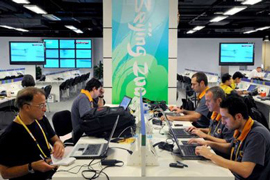Chinese leader vows ‘more reforms’
Beijing marks 30th anniversary of Deng Xiaoping’s move towards capitalism.

“Since the reform and opening up, the fundamental reason for all the achievements and progress we have made has been our creation and development of the socialism with Chinese characteristics,” he said.
Closed society
More than 6,000 party leaders, legislators and military officials attended Thursday’s event at the Great Hall of the People.
| In video | ||
|
|
Thirty years earlier, on the December 18, 1978, the Communist party ratified the decision of Deng Xiaoping, then the country’s leader, to abandon the strictly closed society of his predecessor, Mao Zedong.
It also allowed small-scale private farming, beginning the country’s move away from Mao’s vision of communal agriculture and industry.
Since then, China’s economy has grown into the world’s fourth-largest behind the US, Japan and Germany. Annual per capita income reached about 19,000 yuan ($2,760) last year, up from just 380 yuan in 1978.
But the modern industries have also brought with them pollution and an increasing number of industrial accidents.
Economic downturn
Hu acknowledged that there was still a huge rich-poor divide between urban and rural areas, and that the China’s agricultural foundations remained week.
“There are still a lot of people who live in poverty,” he told party delegates.
More than 100 million of the 1.3 billion Chinese still struggle on less than $1 a day, that is down from 800 million in 1978, but hundreds of millions more get by on just $1 to $2 a day.
China’s reliance on exports and foreign investment has also seen its growth affected by the global economic downturn.
Factories have been closed and unemployment has risen.
Exports dropped by 2.2 per cent in November, the first monthly fall in a numbers of years.
Authorities have cut interest rates and promised to spend more than half a trillion dollars to stimulate the economy.
Shadow of sentences
Amid the events marking the anniversary of the ratification of Deng’s liberalisation agenda, China has faced criticism for sentencing two people to death for attacks in Xinjiang province .
A Chinese court sentenced two people to death for an attack that killed 17 people in the Xinjiang border region, state news agency Xinhua reported on Wednesday.
The attackers allegedly crashed a lorry into paramilitary police in August, before detonating some explosives in the city of Kashgar.
Abdurahman Azat, 33, and Kurbanjan Hemit, 28, said to be residents of Kashgar, were convicted of murder and of illegally producing guns, ammunition and explosives by the Intermediate People’s Court of Kashgar, Xinhua said.
Fifteen people were wounded in the attack, which took place a few days before the start of the Olympics.
Internet censorship
Speaking to Al Jazeera, Victor Gao, director of the China National Association of International Studies, said that China is moving in the direction of greater democracy and greater human rights but has not reached the final stage yet.
“We still have many years to go. But I think people in the outside world need to be patient with China. I’m sure we’re moving in the right direction,” he said.
 |
| China had relaxed internet access and media freedoms during the Olympics [EPA] |
China has also come under criticism for allegedly censoring websites in a U-turn on its promise to expand media freedoms in the run-up to the Beijing Olympics.
Beijing has said it has a right to block websites it deems to have broken its laws, such as by recognising “two Chinas” – a reference to self-ruled Taiwan which Beijing claims sovereignty over.
The Chinese-language websites of the British Broadcasting Corporation and Voice of America, along with the Hong Kong-based media Ming Pao and Asiaweek, are among sites that have been inaccessible in China since early December, according to Reporters Without Borders.
“Right now, the authorities are gradually rolling back all the progress made in the run-up to the Olympic games, when even foreign websites in Mandarin were made accessible.
“The pretence of liberalisation is now over,” the group said in a statement.
Despite dramatic economic changes, China’s political system remains strictly controlled by the Communist party and dissent is seldom tolerated.
On Wednesday, the European parliament awarded the human rights Sakharov prize to jailed Chinese dissent Hu Jia, known for his campaigning for civil rights, the environment and Aids victims.
Hu Jia was arrested last year after giving testimony on human rights in China to a European parliamentary committee via video-conference.
He is now serving a three-and-a-half-year prison sentence for subversion.
